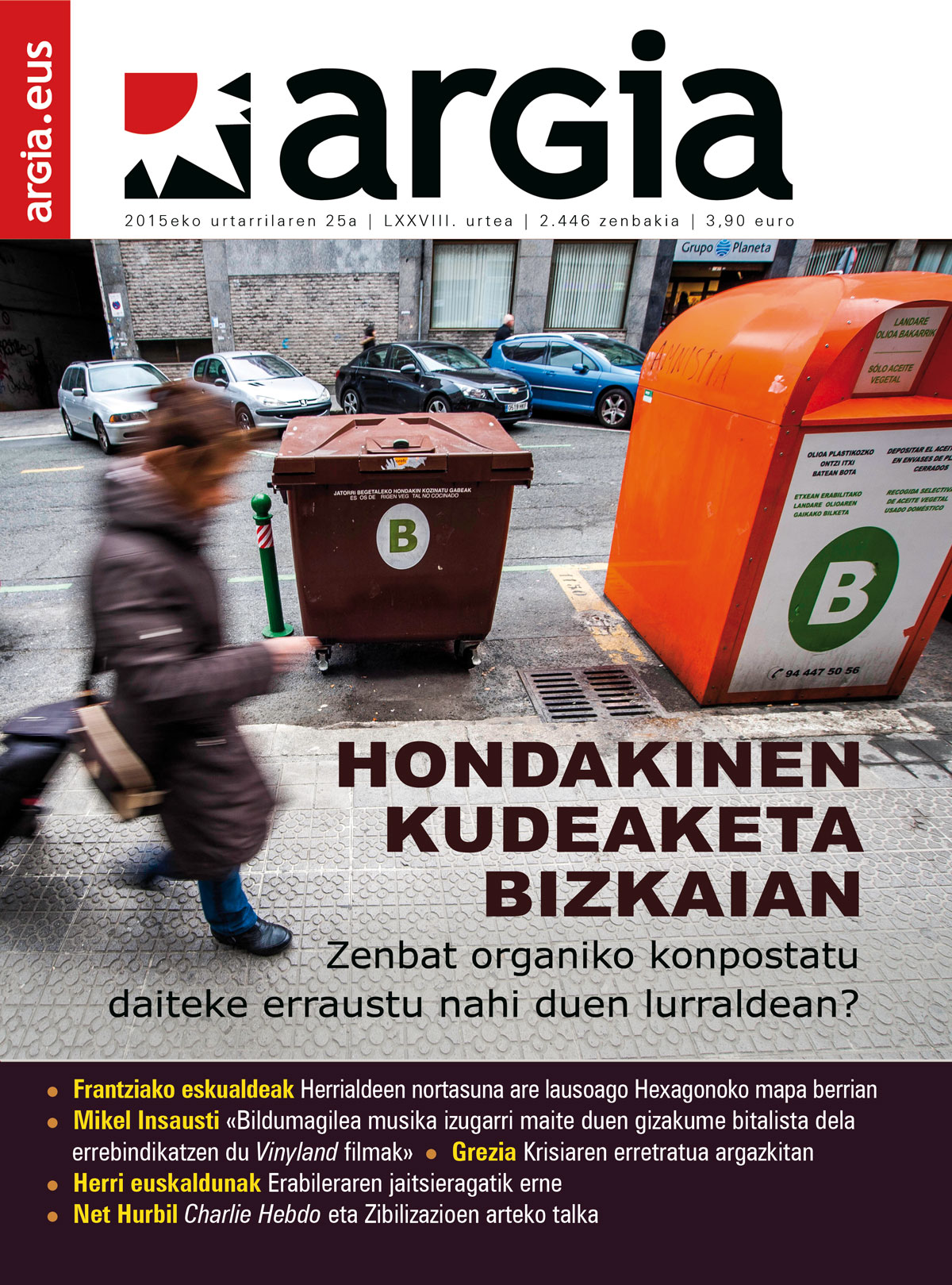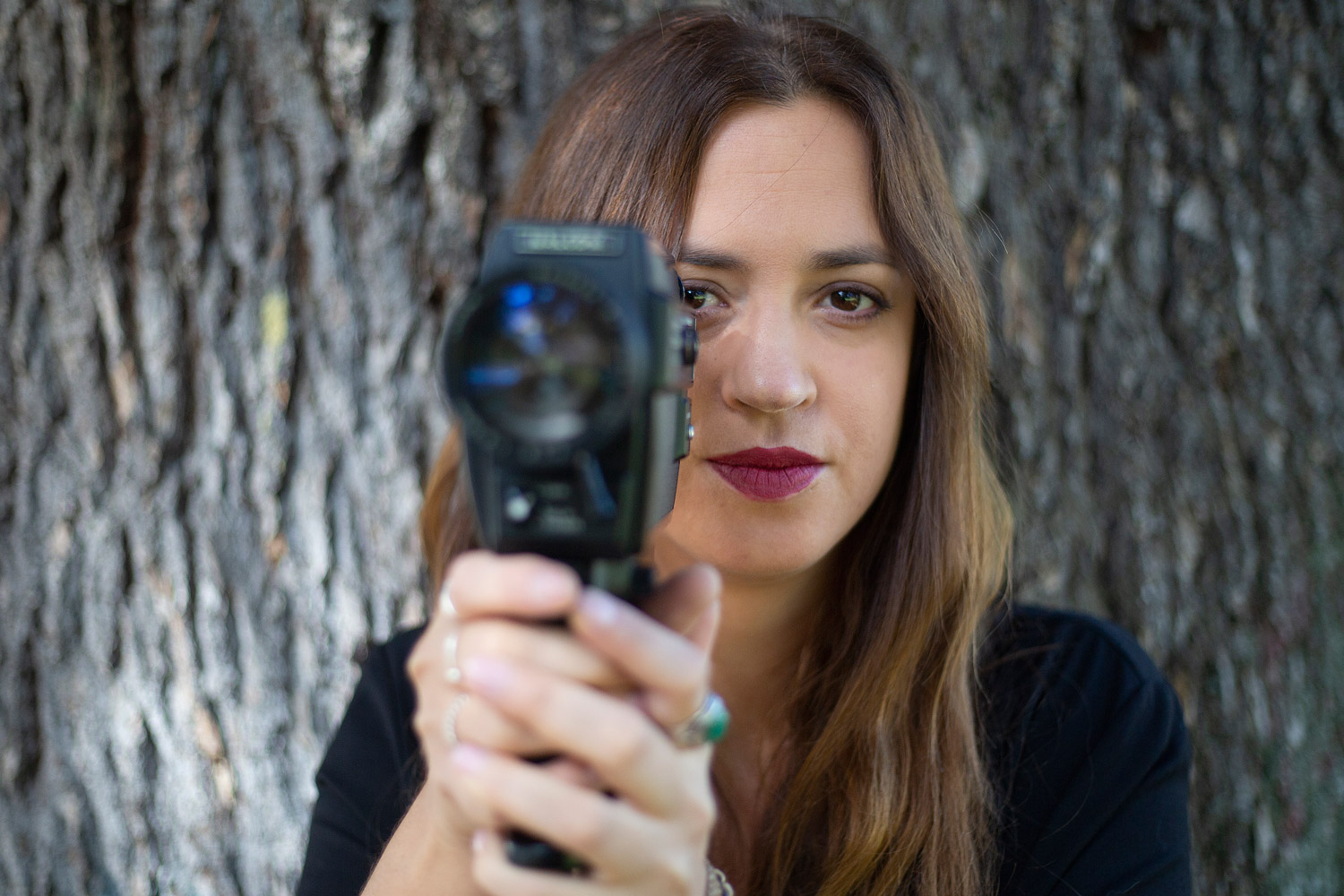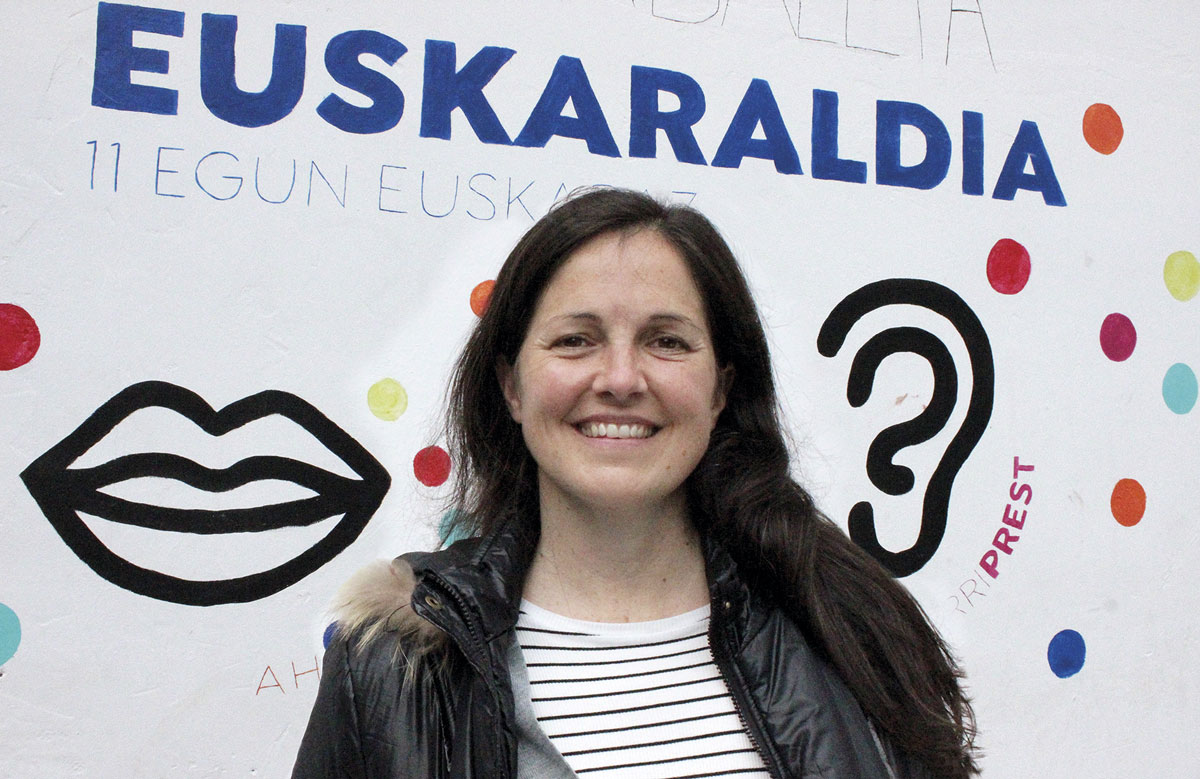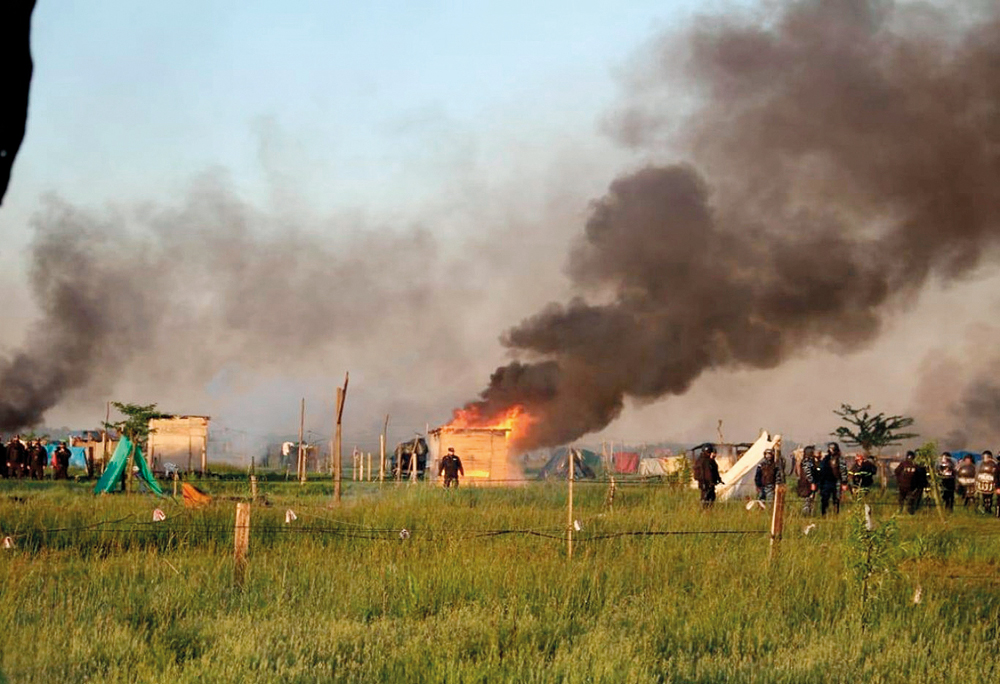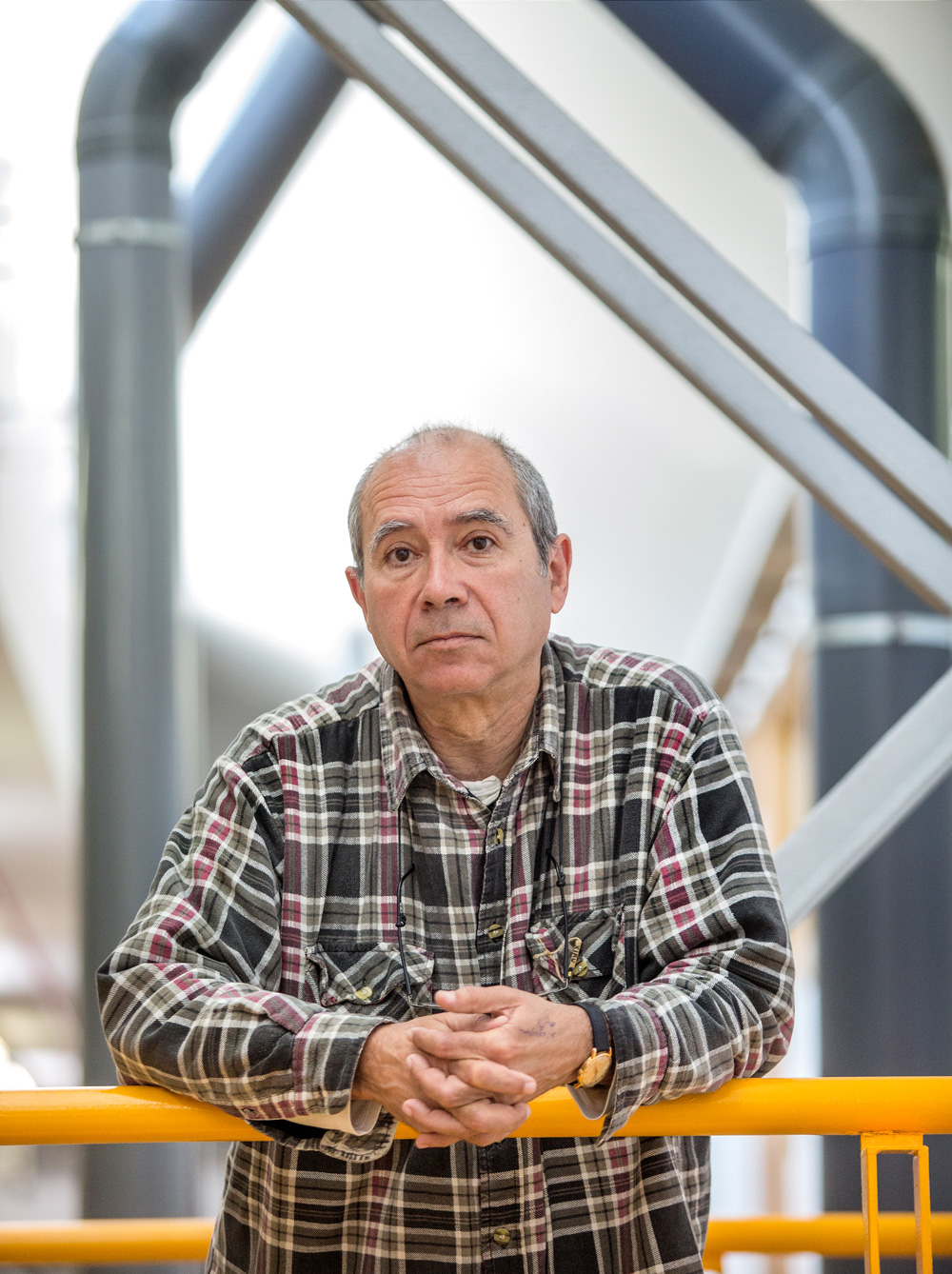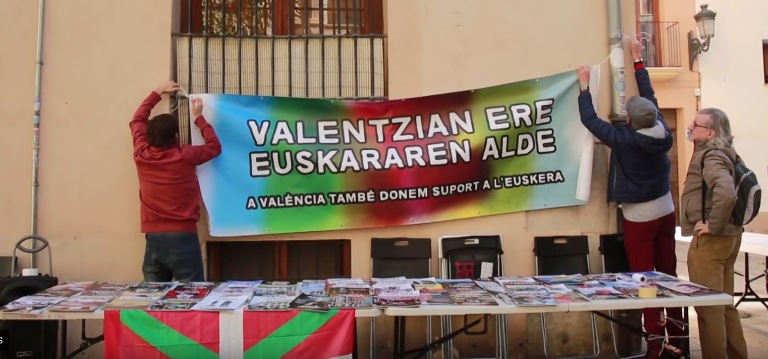"I do a lot of things, but they are all united."
- He came to Euskal Herria on the occasion of the Durango Book and Record Fair, with his new novel The Hammer of Witches in hand and, above all, ready to make known the Basque speaker created in California.
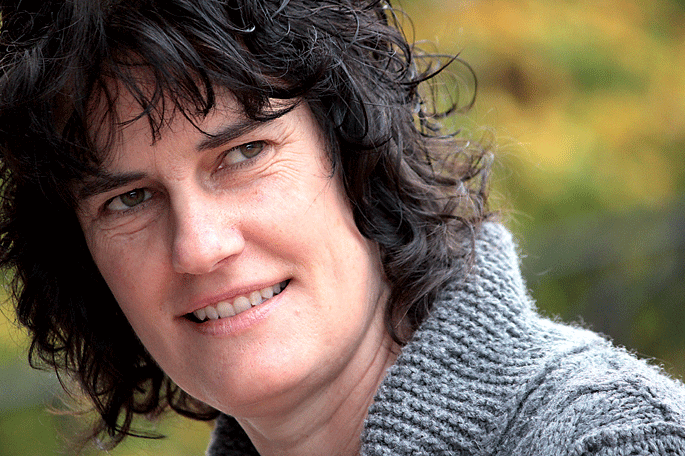
It is not the first time it has come.
To the Basque Country, no. To the Durango Fair, yes. I came when I was a kid, when I was 6-7. Then I went back to 13. And from then on, I come often for my work. I mean, to investigate. And I've also come to sing, with the NOKA group.
You are Echeverria Mendiburu. Pilartxo, mother. The book you brought to Durango is dedicated to it.
Yes. Parents, Baztaneses, Orabida. From Elizondo to Dantxar there is a path that Orabidea says. There's a neighborhood there. His father's house, Ansonea, is from Amaiur. Brunette of Lekaroz. I also have an aunt who lives in that part, and I think her house is from Lekaroz. It's a lost place on the mountain. It’s hard to explain…
You are a Californian, you are realizing Basque lands for me, because I don't know.
Ha, ha, ha. That is not possible! Da Lekaroz, not Oronoz. Da Amaiur, no Elizondo. It's -- they're all there somewhere. A nice place, anyway, in the Baztan.
Baztaneses in California and Nevada. What's the story of your family?
His father went to America in 1954. I already had two brothers who had left. The fourth brother left the year after my father's departure. My father spent six years there, he came, married my mother in 1960, and they thought about living there. Obviously, they were here a moment after the wedding, so their father would do the papers, and they went to Chino, California. My mother also took a premium and married my father's brother. And my father's older brother also married my mother's sister. Everyone at home!
This is how you learned Basque…
Yes, it was my first language. The cases aren't so much in California, but it's pretty normal there among the people of Baztan. In Bakersfield I know another family, I think they are from Lekaroz: they are five brothers, they have gone there; their children also know Basque. It was normal for us. We learned the first Basque. Then, when we grew up, we went to school, we learned English, and we started to speak a little bit in English. The mother was afraid. “You will forget the Basque!” So every day, when we had coffee with milk, our mother would tell us. “If you don’t speak Basque, I won’t give you coffee with milk.” We were four kids, and we all remember. “I will make Basque!” I wanted coffee with milk... I've even composed a song about this. Thanks to cafésna. Here's our story. Ja, ja…
He has just mentioned Chino and Bakersfield, not a few Basques in those towns around Los Angeles.
There's a Basque there, and before it was more. We already have a club, Chino Basque Club, made up of one hundred and twenty families. But it's becoming more chipon: not much has come from here, not to Chino or to Bakersfield, but it does have a Basque Chipi house, but a lot of life. Every month we make the food, and sometimes we have musicians from here, or txalaparta, or whatever. In the way of expression, we held a big party on the weekend Labor Day, on the first Sunday of September. Sometimes it's a whole day party and sometimes more than a day. Paid between the Basque Town of San Francisco and Chino, we brought a group of music from Euskal Herria, and we celebrated a franca holiday in two picnic spots, one after the other, for two weekends.
He has studied Human Biology at Stanford University. PhD in Sociology, San Diego.
You have Biology, Anthropology and Sociology, if you want. I came here in 1987 to do my first research. I spent six months in Oxford and three months here. Now I am here to do the research, singing with the NOKA, watching the family…
You also have studies of sociology of language, as I've read. Themes like identity, religion, culture ...
I started doing an ethnography job, looking for the links between Euskera and ethnicity. I started studying the use of pronouns in the New Testament and Jean Duvoisin's Bible. For example, in the Bible of Protestants they are always tuteing with God and with everyone. In Duvoisin's work, on the contrary. "There's something there! I said to myself. I say that the Protestants wanted people to read the Bible, and that is why they have bitten and have not done so. Leizarraga did that, Duvoisine didn't. The road to Leizarraga is now impossible. I am in it, and I am also investigating the characters of mythology, whether they are Mari, the lamias, the witches… Their world also returns to English, as most do not return to English. There, too, you see that noka is being used a lot, although it is now being lost. It's interesting to see Noka among the witches, in songs and ancient texts.
However, you have no other purpose than the description.
Interpretation. It's like when I compared the Bibles of Catholics and Protestants. Among the Catholics is the priest, and the Christian does not speak a little with God, but uses the zuka. It is quite the opposite of the Protestants. But, however, ancient texts do not always speak the same way: in one they are noka, in another they are the zuka… I want to investigate that.
When you mention witches, your novel shows your world.
And I'm not sure how I got there! We are singing in the NOKA group and in some songs you already see there were witches. Much more recently, I've entered the study of this world. Among the people of Baztan there is also a witch story! While working on the General Archive of Navarra, looking for other things, I saw the text on witches. “This is interesting.” To put it mildly, the documents of the witchcraft trial in Logroño appeared to me, and I copied them. I started collecting information, authentic texts. On the other hand, there is the book by researcher Gustav Henningsen [The Witches' Advocate: Basque Witchcraft and the Spanish Inquisition (1609-1614)], and so, from the beginning, you cannot leave the issue aside. I knew a little bit, but not so much. Now I've learned a lot.
Writing the fictional book, I mean.
Yes. I don't even know how I started. The documents that appear in the book are true, the story is invented by me, even those that didn't happen. So I did. It's my first book. I've written a lot of papers, but not books. And I brought it to the Durango Fair and sold it. I'd heard of the Market, but I'd never been there. Not even in Durango. This year, I took my book and I did both! Ha, ha… “Let’s see who I can meet!” And I've met people, and I've met several publishers, and now I'd like to go back to Euskera first, and then back to Spanish, because here people don't read much English.
Not many have followed your path: Born in California in Euskera, writer, at the Durango Fair, singer of the musical group NOKA…
Those who know Euskera well, perhaps, are one in three in my age. Others know something. In Ontario, in the Chino area, most Basques are from Iparralde and Baztan. If you both know Euskera, it's easier, but it's not easy. Normally you only know one, and the Basque is done at home, there is no possibility of studying outside the house. Among my elders are parents here. Many of those who have children do not speak Basque, but feel Basque, they have entered that world. Many are interested, yes. It's not what our intellectuals, books, etc. are saying, what's really interesting. But they're interested in coming here to see the family.
Ten years ago we were in Chino, in the Basque Club and in the Basco Center there, among others, there was only one Basque over a age…
The youngest, ha, ha, ha. It's age, yes, advanced age. However, there are some younger, married people who take their children to those places. There, you can hear a lot of Basque. On the other hand, they also know how to sing, or they don’t know, but they like it, and they want to sing, to dance… And they do it! We, to put it that way, seventeen years ago, when I was here doing the doctoral thesis, we were going to see what name we had to give our team. The first album came out two years later, and the second, I think, in 2005. From young Cathy [Petrissans] and I had the job of singing together. Andrea [Bidart] is ten years younger than us, but with 13 she had a nice voice. And he started singing with us a little bit later, as if he was young. We sang informally. There was another group, the choir, which was called El Vasco Giro, all made up of women. There we were, too, but now it has been broken. But we were always talking about something and we started.
And you keep on doing it…
Yes, before informally and now more formally. We're making a record with Mikel Markez. Last year Mikel came to Chino and took a tour: Chino, Los Angeles UCLA, Riverside, Gardnerville-Nevada, Tango-Idaho… and other places. It was very good, and we started doing something together, and that's where we are. This year we will tour Euskal Herria, in the South with Mikel Markez, and in Iparralde with Laurent Azcarain, from the Otxalde group. We'd like to make one album, one with Mikel and one with Laurent, and make a tour with Mikel Markez there in June and here in August. It's finally a Chipi world. We don't have musicians like here in our group. But we had contacts with people here, especially through Andrea Bidart, and we started writing and singing songs. The words, some are taken to Etxahun, others are written by us. I was in Donostia, at HABE, alphabetizing myself many years ago. I was speaking in Basque, but I couldn't write. And I learned.
You do a lot of things…
Yes, I like it. I do a lot of things, but they're all united. I’m working for many years and now they’re doing it: it’s happened with the book, with the songs… With many works.
Begoña Echeverria Mendiburu (Chino, Kalifornia, AEB, 1966) Kalifornia-Riverside Unibertsitateko irakasle da. Giza Biologia eta Soziologia ikasketak egina da, soziolinguistika irakasten du, hizkuntza eta identitatearen arteko loturak edo etnografiak gaiak aztergai. Hainbat lan argitaratu ditu, eta hizkuntza, erlijioa, identitatea, generoa, hezkuntza eta beste landu ditu horietan. NOKA musika taldeko kantari da Cathy Petrissans eta Andrea Bidartekin batera, fikzio idazle, euskaraz alfabetatua... Kaiolan etsiko ez zukeen txori kantaria, Begoña Echeverria.
“Ezagutzen duzu Oxfordeko liburutegia? Ez? Ooo, ezagutu behar duzu! Badakizu Bonaparteren liburuak-eta hor direna. Han bada Leizarragaren testamentuaren originala! Ene eskuetan atxiki dut! Bonaparteren lanak ere bai. Eta bertze testu txipi batzuk, euskaraz, XVIII-XIX. mendekoak, eta ni nintzen lehenbizikoa haiek leitzen: plegu-laurdenak josiak ziren oraindik, moztu gabe! Ganibeta eman zidatelarik, ireki nituen pleguak”.
“Oroitzen naiz ene ahizpa Manuelak ez zekiela ingelesa. Joan zen eskolara eta ez zekien batere! Franko abila zen ordea, bazekien bere izena izkiriatzen: ‘Manuela Echeverria’. Eskolako irakasleek erran zioten amari, nahi bazuen pixka bat ingelesa aitzinatu etxean, behar zuela telebista erosi, guk Sesame Street eta halakoak ikusi eta ingelesa ikasteko. Horrela hasi ginen ikasten. Gero, lau haurrok elkarrekin ingelesa mintzatzen hasi ginenean ere, aita-amekin, osaba-izebekin eta hemengo jendeekin beti euskaraz ginen”.
“Oroitzen naiz haurra nintzelarik Elizondon haurrek ez zutela sobera euskara egiten. Eta orain bai! Baztanen, Orabidean euskara zen, baina Elizondon beti espainola. Orain aditzen duzu haurren artean, kalean. Gehiago aditzen da. Eta Durangoko Azokan, gehiena zen euskara!”.
“Generoa da gure musika taldearen izena: NOKA. Toka eta noka, linguistikoki gauza bera dira, baina toka erabiltzen da, eta noka ez hainbertze. Horregatik paratu genuen NOKA izena, jendeari esplikatzeko zer den hori. Badakit leku batzuetan oraindik erabiltzen dutela. Uste dut Amaiurren oraindik horrela dela. Durangoko Azokan ere, toka noiznahi aditzen nuen. Noka, aldiz, guti. Gustatzen zait noka, ez dakit ikasten ahal dudan, baina gustatzen zait”.
Euskal jatorriko 37 gazte estatubatuar Euskal Herria ezagutzen eta euskara ikasten aritu dira uda hastapenean.
San Frantziskoko Euskal Etxeak 40 urte bete ditu asteburu huntan.
I have received an email from Brazil. These are words of beasaindarra Estebe Ormazabal Insausti, a subscriber of ARGIA. It's not the first person living abroad that we've brought to this corner. Little by little we are collecting the opinions, reflections, criticism and praise of... [+]
San Vicente barrutia (Argentina), 1934ko maiatzaren 18a. Mathilde Díaz Vélez lurjabeak Buenos Airesetik 40 kilometro ingurura zeuden bere lursailetan Guernica izeneko herria fundatzeko eskaera helarazi zion Buenos Aires probintziako Obra Publikoetako ministroari,... [+]
Bidelagun elkarteko ordezkariek irekiko dute Baztandarren Biltzarreko orgen desfilea.









